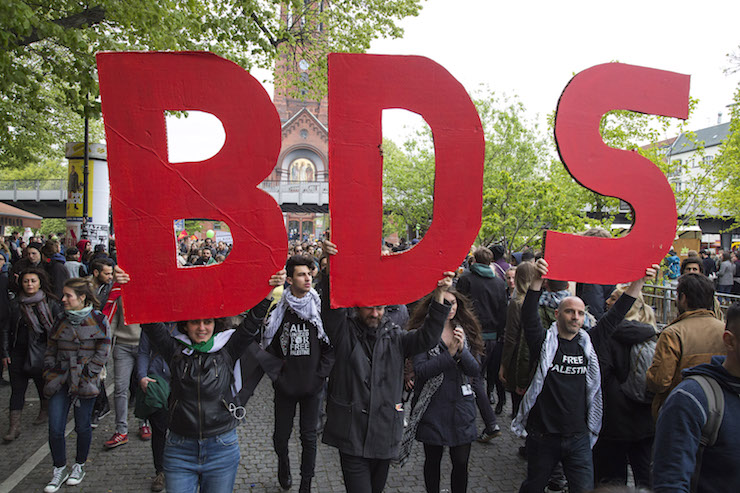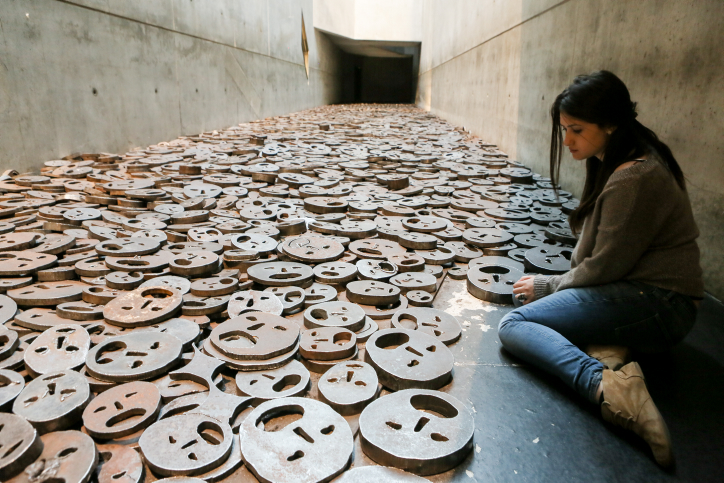The growing attacks on the BDS movement in Germany, which led to the resignation of the director of Berlin’s Jewish Museum last week, are a dangerous sign that critics of Israeli policy should be afraid for their futures.

It has been a month since the Bundestag, Germany’s parliament, passed a symbolic, non-binding resolution designating the Boycott, Divestment and Sanctions movement (BDS) anti-Semitic. The decision is already having a detrimental impact on people’s careers and lives.
Last Friday, director of the Jewish Museum in Berlin Peter Schäfer, a highly-respected scholar of Jewish studies who took the position in 2014, announced his resignation after coming under severe pressure by Jewish community leaders in Germany and the Israeli government, who have accused the museum of engaging in what they deem to be anti-Israel and anti-Jewish activities.
Schäfer’s forced resignation came following a tweet by the museum on June 6 endorsing an article in the progressive German daily Die Tageszeitung, which reported on a letter signed by 240 Jewish and Israeli scholars of anti-Semitism and the Holocaust who reject the notion that BDS is equivalent to anti-Semitism. The letter was submitted to the government after the resolution, urging it not to formally implement it; the scholars argued that drawing that equivalence is not effective and even undermines the fight against anti-Semitism:
The equation of BDS with anti-Semitism has been promoted by Israel’s most right-wing government in history. It is part of persistent efforts to delegitimize any discourse about Palestinian rights and any international solidarity with the Palestinians suffering from military occupation and severe discrimination. We urge you to fight anti-Semitism and all forms of racism without aiding these malign efforts. We ask you to safeguard free expression and protect democratic spaces in Germany, rather than to isolate and silence those who non-violently express their political beliefs.
Neither the museum nor Schäfer have ever endorsed BDS; doing so in Germany is akin to committing career suicide. But staunch anti-BDS advocates in Germany, Israel and the U.S. have managed to portray it as such, creating a feedback loop that presents misinformation as fact. Following the museum’s tweet, The Werte Initiative, a Jewish lobby in Germany that staunchly championed the anti-BDS motion, tweeted its condemnation of the “anti-Jewish” museum — a term first coined by NGO Monitor’s Gerald Steinberg — after the Jewish Museum hosted a talk by philosopher and BDS supporter Judith Butler in 2012 (before Schäfer was director).
Benjamin Weinthal, a fellow with the hawkish neoconservative Foundation for the Defense of Democracies and the European Affairs Correspondent for the Jerusalem Post, published an article earlier this month deceptively titled, “’Anti-Jewish’ Museum in Berlin under fire for supporting BDS.” The American Jewish Committee’s office in Germany also tweeted its condemnation while Israeli Ambassador to Germany Jeremy Issacharoff tweeted his two cents, making it appear as if the museum endorsed BDS.
There have been several efforts to push back since Schäfer’s resignation. But unlike in the U.S. where the anti-BDS efforts that have been gaining momentum are simultaneously facing challenges by Democratic politicians, in Germany there is hardly any space for criticizing Israel. Trying to defend BDS as a legitimate nonviolent tactic is practically impossible.

Yossi Bartal, an Israeli anti-occupation activist with the German-Jewish group Jewish Voice for a Just Peace in the Middle East, and who has been living in Germany since 2006, worked as a guide with the Jewish Museum up until this week, when he submitted his resignation in protest. “After the forced resignation of Peter Schäfer and the clear interference of politicians in the work of the museum as a result of the pressure of a far-right foreign government and their supporters in this country, I feel no longer able to work as a guide in the museum,” Bartal wrote in his letter of resignation submitted to the museum, which he shared with +972.
“Opposition to anti-BDS efforts in Germany is rarely made public, and when it does it comes mainly from Jewish individuals,” Bartal said. “We as leftist Jews do not have the privilege not to concern ourselves with Israeli politics. We cannot be silent like the majority of the Germany left.”
Amos Goldberg, an Israeli associate professor in Jewish Studies at Hebrew University who specializes in Holocaust studies, and is one of the organizers of the original letter signed by 240 academics, told +972 that the organizations representing Jews in Germany claim to have a monopoly on what is considered anti-Semitism. “For many of their leaders, any critique, certainly harsh critique, on Israel is anti-Semitism. Once they accuse someone of anti-Semitism, it can destroy one’s career and reputation,” he told +972. This appears to be precisely what happened to Peter Schäfer, and the fact that he is not Jewish makes it all the more difficult to defend him.
Another letter initiated by Jewish Studies scholars around the world is now being circulated in support of Peter Schäfer and currently has 300 signatories. Penned by Professor Susanna Heschel, chair of Jewish Studies at Dartmouth, it reads: “False accusations have been spread about Prof. Schäfer, and we are appalled that truth is no longer being upheld and that the reputation of a scholar devoted to Judaism would be smeared in public. This is outrageous, and we protest in the strongest terms.”

The number of BDS activists in Germany is notably small, and several sources I have spoken to estimate that there are no more than a few hundred people in the entire country who openly advocate for a boycott of Israel. Like in the U.S., where the movement has more activists and greater legitimacy, the German government spends a disproportionate amount of resources to combat BDS compared to the number of people who actually advocate for it. Moreover, in both Germany and the U.S., where there are reports of rising anti-Semitic incidents and hate crimes, the vast majority of perpetrators of those types of crimes are identified with the far-right.
“Focusing the attention on a marginal phenomenon like BDS deflects the debate in Germany from actual and more pressing issues: racism in general and Islamophobia and antisemitism in particular. It also creates a division among victim groups of various brands of racist crime. Putting BDS centre stage directs the debate towards Israel and Palestine instead of focusing on homegrown antisemitism and racism, including that among communities of migrant origin in Germany, which should be the focus if this was genuinely about antisemitism,” says Riad Othman, who works with the humanitarian relief and human rights organization Medico International.”
The Jewish Museum in Berlin has been a target of staunchly pro-Israel groups since it is one of the only entities in Germany willing to engage on Israel critically. The attacks on the museum have increased since it launched an exhibit last year called “Jerusalem,” which was condemned by the Israeli government for presenting a “Muslim-Palestinian narrative of the city.” Last December, Prime Minister Netanyahu asked German Chancellor Angela Merkel to “fundamentally rethink” its support for dozens of human rights organizations in Israel, including this magazine.
Meanwhile, Jewish Voice for A Just Peace in the Middle East, which is comprised primarily of Israeli expats, could have its bank account shut down this week by the Bank für Sozialwirtschaft (Bank for Social Economy). Jewish Voice member Iris Hefets told +972 that the bank is threatening to shut down the group’s account due to its affiliation with BDS.
The Jewish Museum refused to comment, as did Felix Klein, Germany’s commissioner for the fight against anti-Semitism, who recently recommended Jews in Germany not wear skullcaps in public. Bank für Sozialwirtschaft also declined to comment.
Reporting for this article was extremely challenging, as many people fear to speak on record and are extremely careful with their words. I have spoken to several sources on the ground who told me they know German journalists and members of parliament who are very critical of Israeli policies, but would never say so out loud for fear of losing their jobs. There is a real climate of self-censorship.
Amos Goldberg captured the current political moment, saying that the use of BDS to make false accusations of anti-Semitism has diverted attention from the core of the problem: the entrenching Israeli occupation, with all the severe violations of human rights and international law that accompany it. “These accusations are changing the whole public discourse,” Goldberg says. “Israel becomes the accuser, not the accused… setting the stage for a climate in which if it goes ahead and annexes the West Bank, no one will be able to say anything for fear of being labeled an anti-Semite.”

